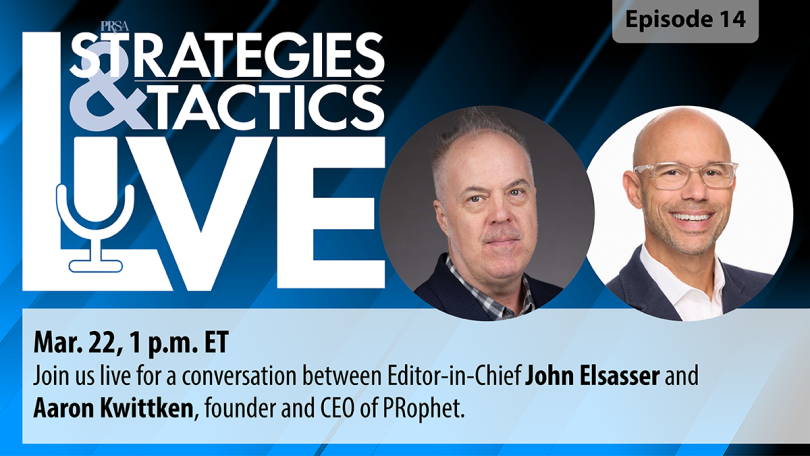PRSA members can access exclusive video content with Aaron Kwittken offering further insights on AI at this link.
Artificial intelligence chatbots such as ChatGPT, which can write texts and summarize documents, stand to improve — rather than replace — the work of communicators, said Aaron Kwittken.
Kwittken said that PR professionals could use AI to predict the reporters who will be interested in their pitches. Then, the generative technology can tell PR practitioners how to make those media pitches more exciting and persuasive.
“You put those two things together,” he said, “and it’s magical for PR people.”
Kwittken, founder and CEO of New York-based PRophet, the first AI-driven platform designed by and for PR professionals, was the guest on the March 22 episode of Strategies & Tactics Live, PRSA’s monthly livestream series on LinkedIn. His article, “The Promise and Perils of ChatGPT,” appears in the March issue of PRSA’s award-winning publication, Strategies & Tactics.
John Elsasser, editor-in-chief of Strategies & Tactics and host of S&T Live, asked Kwittken how communications professionals can reconcile the hype and the backlash surrounding ChatGPT and its newest iteration, GPT-4 as well as Google’s Bard, amid a bombardment of media coverage about the technology.
“If you look back at the last couple of years, we’ve had the Metaverse, NFTs, crypto, blockchain,” Kwittken said. “A lot of that was really hyped, and now it’s been deflated.”
ChatGPT, on the other hand, is perhaps the first new technology since the introduction of the iPhone “to have an incredibly consequential impact on real-life use-cases across multiple industries,” he said. “And PR is one of them.”
The chatbot uses algorithms to learn how one word is likely to follow another. By scraping information from the internet and other digital sources, ChatGPT can draft or redraft a media pitch, blog post, social media post or internal communications message, he said.
Kwittken’s biggest gain from using AI is its ability to personalize pitches for reporters, based on their previous articles. But even when using ChatGPT to write pitches, press releases or guest columns for executives, “you always need humans to bring it to be final,” he said. “You are in control.”
With ChatGPT, “what used to take two or three hours, now takes two minutes,” freeing PR pros “to do higher-value things,” he said.
Agencies are valued according to how long it takes to perform a task, “but why are you paying me to do something the long way?” he said. “It doesn’t serve anybody.” Communicators do high-value work, but “tech will make that even higher-value,” he said.
“If anything, jobs will be saved” by artificial intelligence, Kwittken said. “You’ll be able to upskill people.”
The technology might give PR agencies the space “to provide more services to brands that they didn’t have the time or the budget to do beforehand because they were bogged down with minutiae,” he said. “With AI, we’re going to find more roles for people in PR agencies and inside organizations.”
Kwittken predicts that PR people will become “communications engineers.” When using artificial intelligence, “we’ll own the narrative, but we’re going to use data to backstop our gut instincts. This is truly revolutionary, and I cannot overstate it.”
You can watch the playback of the conversation on LinkedIn.








As an emerging PR professional, tools like ChatGPT both excite and scare me. I feel as though I could best serve the industry by learning this technology before its widespread takeover. Kwittken offered up an idea that I’ve yet to hear in the AI discussion, as he advised that PR practitioners can actually use AI to predict who are the best people to pitch to. Most of the advice regarding ChatGPT that I’ve seen are about using the service to write the pitches, so I appreciated this different perspective.
-Olivia Esquivel, writer/editor for Platform Magazine